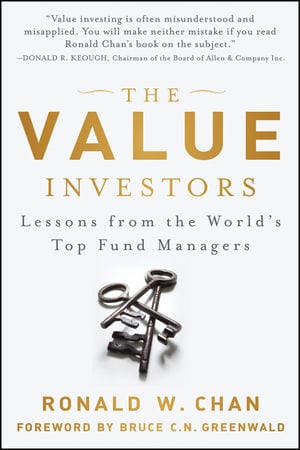After finishing The Value Investors: Lessons from the World’s Top Fund Managers by Ronald Chan, I come to realize value investing is not just a concept in practice. It is highly dependent on your character – either you have it or you don’t. It is no surprise that value investing attracts conservative group of investors who prioritize the downside risk of any investment above anything else.
In this book, you are presented with the contrarian views, the inspiration to go against the grain or crowds.
 The Value Investors is a series of interviews compiled, but it never feels like one. 90 percent of the content is a compilation of biographies, but even if you don’t have time to flip through the entire book, I’d highly recommend that you digest Chapter 13 first. I don’t want to sound over dramatic but it is profound because it is about discovering yourself.
The Value Investors is a series of interviews compiled, but it never feels like one. 90 percent of the content is a compilation of biographies, but even if you don’t have time to flip through the entire book, I’d highly recommend that you digest Chapter 13 first. I don’t want to sound over dramatic but it is profound because it is about discovering yourself.
This book gives a whole new perspective and again – surprise, surprise, it has very less to do with the perfect valuation formula, as many value investors might laud as the holy grail in value investing.
Therefore you won’t see a single valuation formula in the entire book. That might frustrate beginner level value investor, therefore The Value Investors is best to be used as a complement “value investing bible” for intermediate or advanced value investors instead.
Thomas Kahn, one of the interviewee stated:
“If investment game were all about numbers, computer programs would be able to find the right stock all the time.”
It goes deeper, way deeper. It explores the mindset and life stories of prominent value investors, although out of the investing community, these personas are likely less known among normal households, unlike names like Warren Buffett. Although the 12 fund managers’ views on market outlook and their most recent investment performance are of interest of many, public aren’t too interested in who they really are, where they come from (US, UK, Japan, France, Spain, Hong Kong, Singapore) and how the ended up becoming who they are today. Diverse background, they all come from but their grasp on the very fundamental concepts of value investing do converge.
Some highlights:
We all know about the most admired and respected investing legend of all time – Warren Buffett, but let’s up it by one level. How about someone even Buffett himself looked up to as a brother figure and singled out for praise in his 2006 letter to Berkshire Hathaway shareholders? He is the late Walter J. Schloss, the super-investor from Graham-and-Doddsville, as Buffett puts it, who passed away in Feb 2012. Yes, his investing biography is featured in this book, but let just summarize it by saying this man generated a 16 percent compound return annually from 1956 to 2002, without attending college or any business school. If this weren’t written by someone with credentials, I would shake my head is disbelief when I read some of Walter Schloss’ investing mantra:
- We try to buy stocks cheap
- Anything terrible that doesn’t happen to you is profit!
- First priority in the market – to survive and not to lose money
- Because I don’t like stress and prefer to avoid it, I never focus too much on market news and economic data. When people ask me what I think the market is doing, their guess is as good as mine!
Teng Ngiek Lian of Target Asset Management never subscribed to Bloombery or Reuter,s as he does not believe in keeping up with constant changes in stock prices. After all, value investing is about buying good businesses, and stock price fluctuations have nothing to do with it.
The strategies employed by all the fund managers are neither staid nor old-fashioned. Each have their own stories to tell, but they possesses similar personality traits. And temperaments.
That is the ability to suppress that desire for instant gratification that lure many people into investment hell hole.
Also, the ability to accept lagging behind their peers and that they would suffer psychologically and financially in doing so.
And being humble. Ronald Chan summarized this traits in his interview with all of them succinctly:
This quality allow investors to be aware that they are FAR from being invincible, and that they can be wrong at times. They acknowledge the fact that no one is certain about the future, so their priority is to avoid losing money, rather than to generate big returns. Although humility is a virtue in its own right, in investing it translates into margin of safety concept, which defends against uncertainty.
And above all, investing with honesty and integrity, especially with other people’s money, is all more critical.
“Friends and clients may forgive you for the silly mistakes you make in the stock market, but never for a dishonest mistake!”
All in all, the last takeaway from this book is – investing should be a fun and challenging process, not stressful or filled with anxiety.
And for those who complained they cannot find opportunities, then one of the fund manager had this answer for you:
“You either haven’t looked hard enough or you haven’t read broadly enough!”
Read also: 8 Reasons Why? Your Value Investing Isn’t Working And How To Fix This